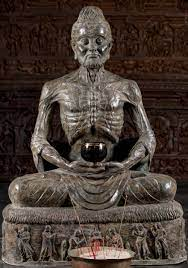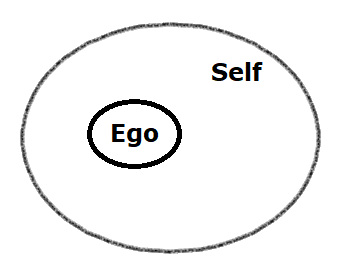So both Plato and Buddha note that things have names. In the Buddhist writing the thing is the form.
Plato asks how things become what they are (essence) and concludes that all things of a particular type must have something in common and that thing is a perfect model of the thing. So all oranges are "oranges" because they bear resemblance to this perfect Orange in the world of Forms. Plato correctly identifies the example oranges as belonging to the senses and the perfect form of orange as living in the mind. For him the mental image is like an imprint in clay and when real things fit that image they become that thing. Its taken until the 21st century to really start to understand how this happens, and in those 25 centuries we have come all the way from clay tablets to neural networks and AI.
Actually not a bad job for Plato altho a few problems we'll ignore. But then he makes the fatal decision. He reckons that the Forms are the truth, and actual experience is an imperfect copy of that perfect form.
Buddha (and Eastern thought in general) sees the forms and the examples side by side and does not make one better than the other.
Forms are the "mind sense" and the actual reality are the other 5 senses. It means that for the East the occurrence of a thing involves all 6 senses. We have the feeling, smell, sight etc of the thing and then the mental processing into a thing we recognise and name.
In the East nothing is thrown away the whole process is watched. For Plato he discards half of the picture, demoting it like a class system into the lower workers who provide the evidence and the sense and the higher thinkers who access the deep essence of the thing. It is the thinkers in the West who know things truly, while in the East the whole thing is needed for knowing.
But the Eastern system has a far superior advantage. The 6 sense can be broken into 2 like Plato: the form (which is the first 5 senses) and the name (which is the 6th sense). Unfortunately "form" is used differently here.. not actually important but sort this out (#TODO)
https://learn.saylor.org/mod/book/tool/print/index.php?id=30538#:~:text=Plato%20used%20the%20terms%20eidos,actually%20existing%20thing%20being%20seen.
In Buddhism however watching the Form and the Name interchange gives us access to a reality "as it is" and this it turns out is the source. Just following ideas means we miss the actual nature of the source, instead becoming blinkered by discrete Forms which are inadequate to capture the subtlety of reality.
Its a common thing noted in Love that partners see their beloved as perfect, and then even more sophisticated see them as imperfect but love them all the same. Shakespeare Sonnet 130 starts:
My mistress' eyes are nothing like the sun;Indeed the "individual" is under Plato an imperfect Human, and surely this leads all the way to German Ubermenches, Jewish Superman and master races (of which both Jews and Germans have toyed with). This idea that there is a perfect example has been incredibly influential.
Coral is far more red than her lips' red;
If snow be white, why then her breasts are dun;
If hairs be wires, black wires grow on her head.
...
Clearly throwing away the senses as subordinate to the Mind is a nonsense. In fact its obviously the sort of thing the Mind would do!
So we give the Mind a sharp reprimand and take the senses back.
Now we observe the strangest thing. Wittgenstein mentions in his Philosophical Investigation how odd and detached the name "Red" is from teh actual sensation of the colour. There is nothing red about "Red" at all. Indeed by SRH there could not be. If we needed to write Red to indicate the colour then the "red" doesn't do anything. We might as well write Green to indicate the colour and we know that it means red. "Red" must have nothing to do with actual red to be useful. By SRH they must be different. Wittgenstein does not say this, but he analyses the "redness" as belonging to the way that the otherwise meaningless token "red" is used in real world sentences. As language learners we start to get the point that "red" gets used culturally in situations that involve this colour. Its not that "red" exists in the world and we just label it, it is more subtle. The language culture defines under what circumstances we use this word correctly and that has a two fold effect. On one hand we start to be able to Name red things. But equally on the other hand we start to know what red is! Time for my favourite picture again.
Until we learn the word "red" we do not know what red is. There is a whole spectrum of colours out there how do we know when red becomes orange? That division becomes more accurate as we learn the language better and use this word more. Even expert speakers get into this. You describe something as orange and someone else says red. The language is not so exact that we always know where the boundary is. This means that we do not actually know for sure what is red and what is orange. That word "red" is not so exact. And yet looking at a tomato we definitely see a colour which is--we are pretty sure-- is red. So learning "red" is two fold defining both what is actually out there, and also knowing how to name it. It is NOT as simple as red exists and we just learn the word for it. This is the mistake made by kids learning a second language and my French teacher used to dislike the use of = in definitions e.g. "Fenêtre = Window." He would say they are not the same. True the French use this word for the same thing that English say "window" but they are just similar they are not the same. We see it more clearly in idioms like "joie de vivre" for which English don't have such a term and either use this or a direct translation.But enough! Sooner or later this phantom must be seen as a mistake and not there, something that we can just forget about and suddenly realise we forgot about it and it made no difference, it just fell off our back and we didn't even notice. It made no difference, but realising it made no difference was the difference! Wow we think, the room I never even noticed I was standing in has gone and in its place things extend freely in all directions.
So this is the difference between Plato and much of Western thought it wants to get to some summary and core Law so it can throw the worthless data away and be left with an essence, some Philosopher's Stone. But every cut to throw something away is injuring the world. It all goes together, you can't escape any part of it.
In the East by contrast it is all already there and the only job is to see it all. And when we have seen it all the most amazing thing we see is that no where in all of it lies anything call myself. The whole world comes together in a world with no part called me. How bizarre we thing. I always thought I was a part of the world, or perhaps I thought I was inside the world with the world wrapped around me. Or perhaps I thought I was not really of the world, and somehow dropped in to the world through being born and I was leave again when I died. But however we thought about it we always thought we were somehow contained in the world. But when we start to see the whole thing we see there is no room for us anywhere. We are not in the senses, we are not the thoughts, we are not in the decisions, in the choices, not in the memories, not in the imagination or fantasies: in every case we are watching from another place. Suppose me remember lying on the beach on holiday. Yes in one sense its us, but not really we are watching that memory right now! But where are we then? definitely not in the memory! So we think about what we will do tomorrow. We imagine asking a date out and sitting in the restaurant opposite her. Again in a sense its us, but not really we are sitting right here watching that fantasy. So we decide to invest money in the stock market. Again we are sitting here watching that decision happen, watching the thoughts and analysis of which sectors will experience growth. We are clearly not those actual thoughts or the conclusions not the decision, and we are not the moment we click BUY because like with everything we are sitting in on it watching it from another place. And we have funny ideas about where that place is. Like its in the body, or its in a soul or literally anything we try and invent a place to try and prove we exist in the world. But we don't. There is no place that needs us. It all fits together and works all by itself without one jigsaw piece missing that is "me" shaped. We are entirely surplus to requirements, redundant.
Oh how depressing we might think I don't exist and the world does not need me. I give up. Well just watch all those thoughts happen! None of them are you either. You are untouchable.
But perhaps we see something else. If we are redundant and play no part of life then why waste time on thinking about "me." Surely if it makes no difference then just give up with this "me" thing. Just let it go, to use that common phrase like just letting go of a kite we let it fly off without any care. It is nothing to do with me, just let it go.
Oooo how weird that freedom is. Perhaps we are not ready for it. A bit bewildering. Its not something we are familiar with. It may take some time. Its unlikely to come in one flash of freedom, it will take many goes letting go a bit more each time. If we are very trained already it will be immediate liberation.
Technically what is happening is that we have found we are "attached" to the idea of a self-contained, separate self that exists by itself, like a submarine with its hatches closed and the world turning up on its display panels. Inside we live cut off and separate from the world. Despite this our happiest moments are when we forget about this and engage with the world freely and without barriers. But it always crashes and we retreat back into the submarine. we are having a great time and then someone says something insulting and we take offence and we rush back into the submarine to re-establish ourselves as a separate entity and we may load up some weapons and return fire on the person who insulted us.
But while meditating and we realise that we were watching the insult come in, and we were watching it hit its mark, and this triggered some pain, and we did not like that, and it humiliated us, and we felt injured and small and we started to struggle to build ourselves back up and we fire some weapons back to hurt the other person so they did not do that again and treated us with some consideration in future, and these missiles hit their mark and that person got hurt and perhaps they backed off and we felt big again, or perhaps we ended up starting to hate each other... and all the while we can watch all this happen like its happening to someone else. I mean you can't "be angry" and also watch anger happening. Anger is more like a bad smell, it starts as a weak noxious odour but after a while it surrounds us and we can't think or move without being suffocated by the smell. It seems to be completely enveloping us and we cannot escape it. If we sit with it for days or even months or years we get used to it and its part of our world like a rotting rat under the floor boards. But all the while we are not the smell! That anger is not us. It is happening to us! And yet didn't we decide to get angry because we felt insulted? This is the mistake at the heart of it all. When the insult hit is mark, we were not where to be seen. We were NOT THE MARK we were only a WITNESS TO IT hitting the mark! How odd to start a war because of what we witnessed, but which was nothing to do with us! Let the mark start its own war, we don't have to do anything!
Okay perhaps that sound callous. If we are Christian we know the story of innocent Jesus being accused of crimes and being horrifically whipped and executed on a cross. If we are Buddhist we know of the Black King (Kala Raja) who tortured and dismembered Buddha in a past life. Neither Christ or Buddha showed any hatred for their persecutors! While all these arrows were reigning in on the pathetic bodies of Christ and Buddha, while the people were experiencing the worst injustices at the hands of evil people who deserved to be tortured and punished themselves neither Jesus nor Buddha raises even one drop of hatred or one drop of will to save or protect themselves. They both knew they were done for and would die, what the use of vain struggle. There was nothing to do. So with this barrage of insult and injury falling upon them they were able to see the "mark" take it all. But they were not the mark, they did not identify with the mark, they were just sorrowful witnesses at the horrors unfolding experiencing only compassion for the body that was being violated and abused and compassion for the people who had descended so far in their lives to be able to do this. This coolness of compassion is what happens when we see we are not the "mark" but only witnesses of it. We are actually untouchable, but those who wish to hurt us are caught in a the grand illusion and suffer from not knowing this themselves.
It is ironic that in Judaism the word "Sin" actually means "miss the mark." It refers to an unskilful archer missing his target and is an analogy for how the sinful fail to act in the correct and most beneficial way. In the example above of insult may have only been intended as a joke and we over reacted, or perhaps it would have been better to just let the person make his point and let their anger calm down rather than fuel it. There are always skilful ways to deal with insult and injury that never involve fighting back. Ironic again that the analogy is of an "archer" is used who is probably firing arrows in retaliation or defence when this is most probably the least skilful action. So doubly ironic then that the true path is to let skilful archers hit their mark, but instead realise that this mark is not ours and is of no interest to us!
So eventually when we put the last piece into the world jigsaw and see the whole thing complete before us, we see that the piece we thought was ourselves actually fits neatly into the picture in which there is no me. It was a mistake, and we spent all that time holding on to a mistake. We can just let it go and feel the refreshment of just being.






















